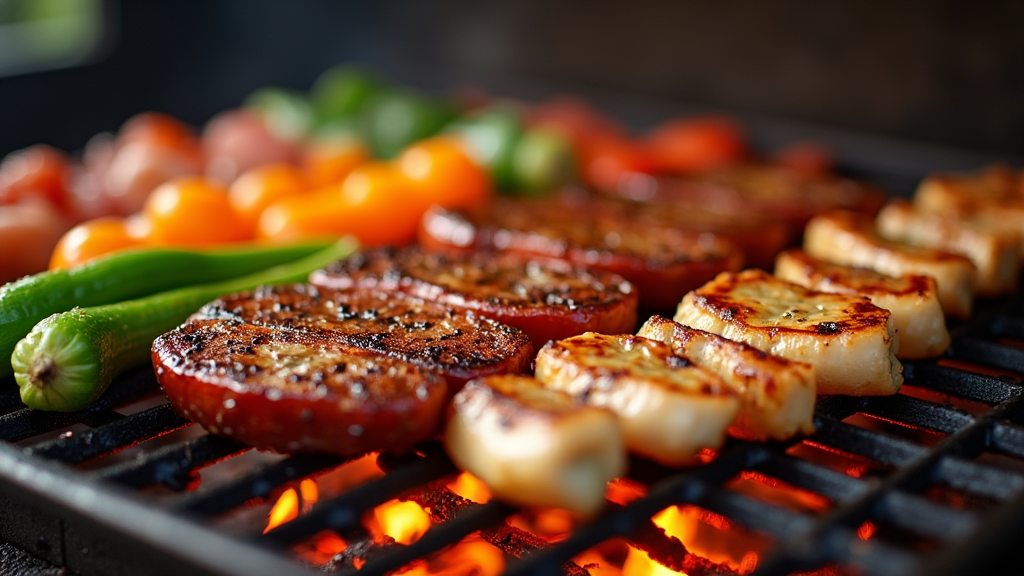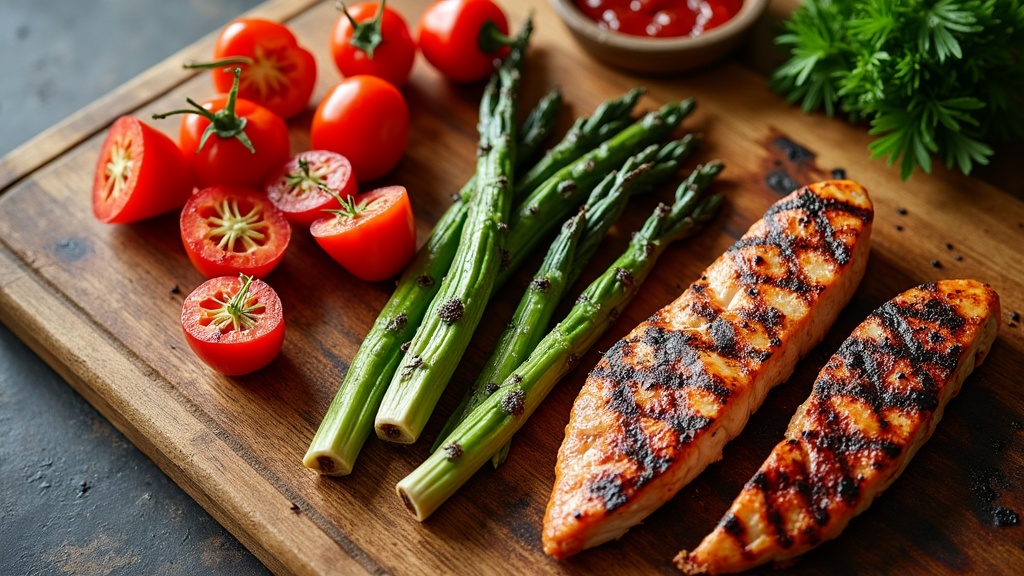Grilled meal prep offers a refreshing twist to healthy weekly planning. Cooking over a grill creates flavors that are both natural and satisfying. The process of meal prepping grilled recipes allows for a balanced approach to eating well. Whether you are looking to manage your weight or explore simple cooking methods, grilled meals can easily fit into your weekly routine. There is something truly satisfying about preparing your meals outdoors, where the open air and natural elements add an extra layer of excitement to every bite.

Key Equipment and Ingredients for Grilled Meal Prep
Getting started with grilled meal prep means having the right tools and ingredients on hand. A reliable grill is the cornerstone of the process. Gas grills, charcoal grills, or even portable electric grills can work well. It is important that your grill heats evenly and is easy to clean, ensuring you can focus more on cooking than upkeep.
Along with a good grill, you will need the basic tools such as a spatula, tongs, grill brush, and a meat thermometer. These items help maintain safety and ensure that your food is cooked just right. High-quality grilling tools not only make your job easier but also step up the flavor profile of your meals, making every bite a memorable experience. Taking the time to invest in durable instruments can really add to the overall fun and creativity involved in planning your meals.
Ingredients are equally important for a fulfilling meal prep experience. Choosing lean proteins like chicken, turkey, or fish helps keep your meals healthy while still delivering robust flavors. You can also add a vibrant selection of vegetables like bell peppers, zucchini, and asparagus, which provide both color and crunch. For those who prefer plant-based options, marinated tofu or tempeh can be exciting alternatives. Herbs and spices work wonders on the grill by layering flavor without extra calories, and seasonal produce often brings a richness that is hard to replicate any other way.
Seasonal produce is a great choice for meal planning because it brings natural flavors and essential nutrients to your table. When you pick ingredients that hold up well under high heat, such as hardy vegetables, you allow yourself to embrace the grilling process fully. Investing a bit more time in selecting fresh, robust components at your local market can truly transform your culinary routine.
This detailed attention to both equipment and ingredients sets the stage for tasty, nutritious meals throughout your week and opens up opportunities for creative recipe modifications and new flavor experiments.
Getting Started with Grilled Meal Prep
Before you start grilling for the week, it is useful to set up a plan. Planning ahead boosts efficiency and cuts down on time spent in the kitchen later on. Begin by deciding what meals you want to include in your weekly menu. Consider a mix of proteins and vegetables so that each meal offers a balanced nutritional profile. Having a plan in place helps take the stress out of meal times and encourages you to experiment with different combinations of flavors.
If you are new to the concept of meal prepping, here are a few steps to ease into the process:
- Plan Your Menu: Choose recipes that use similar ingredients. This helps cut down on waste and keeps grocery shopping simple.
- Gather Your Equipment: Make sure your grill is in working order. Clean your grill thoroughly before starting and check that your tools are ready for use.
- Marinate in Advance: Marinating proteins a few hours before grilling helps infuse flavors. Even a quick 30-minute marinade can make a notable difference in taste.
- Pre-Chop Ingredients: Wash and chop vegetables ahead of time. This not only saves time but also ensures that everything is ready when you need it during busy meal prep sessions.
- Set Up Your Work Space: Organize your counter space and have all your ingredients measured out. This approach avoids unnecessary delays during cooking and makes the process smoother.
Following these steps lays a solid foundation for a smooth process. The extra planning not only eliminates stress but also sparks creativity when you decide to tweak recipes or try new flavor combinations. As you become more comfortable, you can expand your cooking repertoire and start integrating more elaborate techniques into your routine.
Adding to your experience, consider spending an extra weekend afternoon researching new recipes. Look through cookbooks or online blogs to get inspired. Taking the time to map out your weekly meals in detail can make a big difference when life gets hectic, ensuring you always have a backup plan ready.
Things You Should Probably Consider Before Starting Your Grilled Meal Prep
Grilled meal prep, like any cooking method, involves a learning curve. There are a few common challenges and factors to consider that can help you avoid potential setbacks and ensure a smooth experience. Being prepared for potential issues means that you can quickly adapt and continue enjoying the process.
- Food Safety: Ensuring that your food is handled safely is key. Be mindful of cross-contamination and maintain proper cooking temperatures, especially with meats, to avoid any health risks.
- Timing and Temperature: Grilling requires precise timing. Overcooking may dry out lean proteins, while undercooking can be unsafe. A reliable meat thermometer is a must-have tool to keep your temperatures in check.
- Ingredient Quality: The taste and texture of your final meal depend largely on the quality of your raw ingredients. Fresh produce and top-notch meats usually produce the best results, making each meal a festival of flavors.
- Budget Considerations: Although grilling often suggests an outdoor and leisurely experience, careful budget planning is really important. Buying in bulk or choosing seasonal items can help keep costs down without sacrificing taste.
Food Safety
Food safety is one of the biggest concerns in meal prepping. It is very important to store proteins at the correct temperature until you are ready to grill them. Using clean utensils to prepare vegetables and meats on the same workspace is essential for preventing cross-contamination. A simple tip to maintain freshness is to marinate your proteins in a sealed container in the fridge. Regular hygiene checks and proper storage techniques are part of staying sharp in the kitchen.
Timing and Temperature
Grilling is an art that relies on timing and careful temperature control. Each ingredient has its own cooking time, so it is important to not generalize. For instance, chicken breasts might need a longer cooking period compared to vegetables. Using a reliable meat thermometer helps you keep track of internal temperatures, ensuring that proteins remain moist and delicious while being safe to eat. A little trial and error at first can quickly improve your timing skills over repeated sessions.
Ingredient Quality
Using high-quality ingredients makes a big difference in meal prep outcomes. Fresh vegetables provide a crisp texture and an eye-catching display when grilled properly, while high-quality proteins absorb marinades better, leading to richer and more satisfying flavors. Investing in fresher ingredients can take up a bit more time and effort during shopping, but it absolutely pays off in the final taste and nutritional value of your meals.
Budget Considerations
Meal prep is both a cost-effective and nutritious method for daily eating. Planning your menu based on weekly specials at your local market or picking seasonal ingredients can reduce costs while still keeping meals appetizing. A bit of flexibility in your recipes—like swapping one protein for another—can help manage your budget while ensuring that your taste buds never get bored. This mindful approach to cooking also teaches valuable lessons in resource management and culinary creativity.
These factors, while requiring some attention, should not deter you from starting your grilled meal prep adventure. With proper planning and ingenious resourcefulness, challenges can transform into opportunities for creative cooking that bring both fun and flavor to the table.
Advanced Tips and Tricks

Once you feel confident with the basics, you might want to explore some advanced techniques that can further step up your grilled meals. There are several ways to bring more flavor and sophistication to your meal prep without overcomplicating the process. This is a great time to experiment with different methods that can really open new culinary doors.
Experiment with Marinades: Try out different combinations of herbs, citrus juices, and spices. Even a slight twist in your marinade can truly boost the natural flavors of grilled meats and vegetables. When you experiment, you stumble upon that balancing act between acidity and savory elements creates a well-rounded and delicious profile.
Master the Grill Marks: Achieving those even, beautiful grill marks not only looks appealing but can also signal that your food has been cooked at the right temperature. With practice, controlling your grill’s heat and managing timing will let your food develop a slightly charred yet juicy finish that is both attractive and tasty.
Vary Cooking Techniques: Grilling is not limited to direct heat. Consider mixing things up by using indirect heat for larger cuts of meat. You can also try incorporating smoking techniques with wood chips, which adds a subtle, smoky essence to your dishes. Trying out different methods keeps your cooking experience fresh and always evolving.
Incorporate Fresh Herbs Post-Grill: Adding a finishing touch with chopped fresh herbs right after grilling can give a boost to the aroma and overall flavor. Herbs like basil, cilantro, or parsley work wonders to brighten up the dish. This extra step not only pleases the palate but also elevates your presentation, making every meal feel extra special.
These advanced tips are well worth exploring. They offer creative ways to tailor your recipes to your taste, converting a simple meal prep session into an all-in-one culinary adventure. As you try new techniques, your confidence will grow, and you might even start coming up with your own signature grilling methods that make each meal a standout event.
The Basics: How to Plan a Weekly Grilled Meal Menu?
Meal planning is at the heart of successfully incorporating grilled recipes into your weekly routine. Planning not only ensures that you have balanced meals but also minimizes last-minute rushes and errand runs. The process begins by selecting a rotational set of recipes that can be tweaked with minor variations to keep things interesting and nutritionally sound.
A straightforward approach is to choose recipes that share common ingredients. For example, a grill-friendly menu might include options like grilled chicken, fish, a variety of vegetables, and even a plant-based alternative. Arranging these items into a weekly theme builds consistency in meal preparation and makes the overall process more manageable.
Consider the following when putting together your menu:
- Protein Variety: Include different kinds of proteins, such as lean chicken, turkey, fish, or even shrimp. This variety not only keeps your meals interesting but also meets a range of nutritional requirements.
- Vegetable Diversity: A mix of vegetables adds both color and essential nutrients. Options like eggplant, asparagus, and corn are excellent on the grill and bring extra texture to your dishes.
- Side Dishes: Complement your main dishes with healthy sides like quinoa salads, grilled fruits, or whole-grain breads. These sides can make your meal more filling without adding too many extra calories.
- Flavor Enhancers: Think about including sauces and dressings. Homemade salsas, lemon vinaigrettes, or yogurt-based dressings can really make your grilled items pop with flavor. They not only add zest but also create delightful contrasts with the main components.
Taking the time to plan your weekly menu with these factors in mind helps reduce food waste and smooths out your cooking routine. It also encourages you to try new combinations and flavors, ensuring that your meals remain both nutritious and satisfying. As you continue to refine your menu, you might even start to notice trends and preferences, which can guide your future planning sessions.
Frequently Asked Questions
Here are some common questions that pop up when planning for grilled meal prep:
Question: What types of proteins work best for grilling?
Answer: Lean proteins such as chicken, fish, and turkey work wonderfully on the grill. They cook quickly and remain tender, especially when they have been marinated properly to lock in flavors.
Question: How can I ensure my vegetables remain crisp and full of flavor?
Answer: Choose vegetables that are sturdy enough to hold up on the grill, like zucchini, eggplant, or bell peppers. Lightly oil them and keep the cooking time short so that you preserve their texture and freshness.
Question: Can I prepare meals in advance and store them?
Answer: Absolutely. Many grilled meals store well in the refrigerator for a few days. It is important to refrigerate them promptly and reheat them properly before serving to maintain both taste and safety.
Question: How do I maintain my grill to ensure optimal performance?
Answer: Regular cleaning of your grill prevents buildup and ensures even heat distribution. Use a grill brush after each cooking session and check for any worn parts that might need to be replaced.
Wrapping Up
Grilled meal prep combines the fun of outdoor cooking with the convenience of planning ahead for a healthier week. With the right equipment, fresh ingredients, and a bit of creative planning, you can enjoy meals that are both nutritious and flavorful. This cooking method allows you the freedom to experiment with various recipes while adapting them to your taste and dietary needs. Taking the time to practice and refine your grilling techniques will pay off in every delicious meal you serve.
Starting a routine with grilled meal prep doesn’t have to feel overwhelming. Focus on quality ingredients, pay attention to details like timing and temperature, and gradually try more advanced methods as your skills improve. With consistent practice, you’ll notice that not only does your overall well-being improve, but the satisfaction you get from crafting meals that are both easy and tasty multiplies.
Grilled meal prep is very important for maintaining an organized week, saving both time and money, and offering a wide range of delicious options that cater to your health and lifestyle. Experiment with different recipes, ask for feedback from friends or family, and most importantly, enjoy the process of cooking outdoors. With each session, you will develop new tricks and tips, allowing you to further customize your meals and truly make them your own.
Moreover, the art of grilling extends beyond just cooking—it represents a way of life. Planning your menu, choosing your ingredients carefully, and taking time to relish the process encourages a healthier and more mindful approach to eating. As you build your routine, you may even find opportunities to share your culinary passion with others through cookouts and gatherings, creating food memories that last a lifetime.
